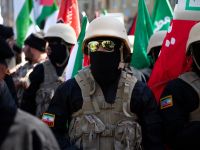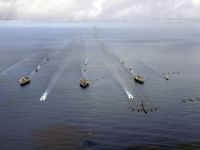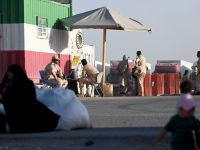Politicians around the Middle East roundly condemned Israel Sunday during a fourth day of violence in the Palestinian territories, amid a growing chorus from more hardline elements calling for revenge and holy war.
The clashes, sparked by a visit Thursday by right-wing Israeli opposition leader Ariel Sharon to a Muslim holy site in Jerusalem also held sacred by Jews, have resulted in the deaths of 35 Palestinians and one Israeli border guard since Friday.
Reactions varied from fear for the future of the peace process, hope that violence would end Israeli occupation, and anger at the ferocity of the Israeli violence.
The situation topped the agenda of a summit between Presidents Bashar al-Assad of Syria and Hosni Mubarak of Egypt, who agreed that "the negative repercussions would adversely affect the peace process."
King Abdullah II of Jordan, the only other Arab country apart from Egypt to have signed a peace treaty with Israel, blamed Israeli "provocation" for the violence, and warned against "the dangers of such (provocative) action on the peace process."
Further down the scale, Islamist militants called for a holy war against Israel.
"Only jihad (holy war) can preserve the holy sites of Al-Qods (Jerusalem)," said the Palestinian Islamic Jihad group, which called on Yasser Arafat's Palestinian Authority to cut off negotiations with Israel.
Hamas, responsible for numerous anti-Israeli attacks, declared a general strike Monday. "We invite our people to take up anew the arms of the Intifada like rocks, slings, Molotov cocktails and knives," the group said in a statement referring to the Palestinian uprising of the 1980s.
Iraq, in its first reaction since the violence started, also used the language of jihad and called on all Arabs to mobilize in support. The Baghdad government issued a statement saying the Palestinians will be at the "vanguard of the jihad to free plundered land."
Iran's spiritual leader, Ayatollah Ali Khamenei, said the only solution was "to continue the jihad against the enemies of Islam" and warned Muslim countries they would be harmed if they failed to support the Palestinians.
An emergency meeting of Arab League ambassadors came out in support of the Palestinian claim to east Jerusalem as the capital of their future independent state, calling it a "red circle which should not be played with."
Arab League Secretary General Esmat Abdel Meguid, like many commentators, compared the events to the six-year Intifada, or uprising, that broke out in 1987.
"We must support this new Intifada until it bears fruit just like the Intifada of 1987, which forced the Israelis to sit down at the negotiating table," he said.
In Damascus, the secretary-general of the hardline Democratic Front for the Liberation of Palestine (DFLP), Nayef Hawatmeh, called on Palestinians to "continue the uprising in the face of ... Zionist repression."
At the same time, many countries expressed anger at Israeli "crimes and carnage," as Abdel Meguid phrased it.
Kuwait's cabinet condemned "the brutal aggressions committed by the Israeli forces" and called on the international community to take necessary measures to "stop such inhumanitarian acts" which represented "a real threat to prospects of peace."
Bahrain's Prime Minister Sheikh Khalifa bin Salman al-Khalifa said "the Israeli aggressions constitute a violation of international conventions."
A statement by Lebanese Prime Minister Salim Hoss said, "We call on the international community, and particularly on powerful states, to act immediately to put an end to the renewed Israeli aggression."
In Lebanon Palestinian refugees demonstrated for a second straight day, threatening that Israel will not be safe if it continues its massacres.
Despite the mounting criticism, condemnation and threat, Israel's acting foreign minister Shlomo Ben Ami on Sunday blamed the Palestinian authority for the clashes, calling on it to come to the negotiating table – (AFP)
© 2000 Al Bawaba (www.albawaba.com)







